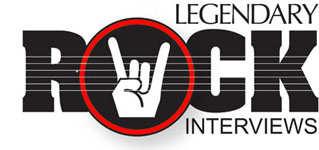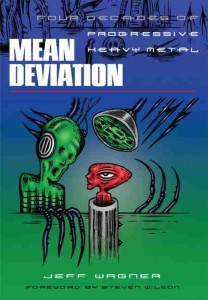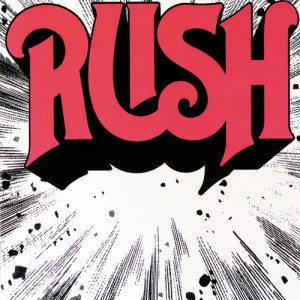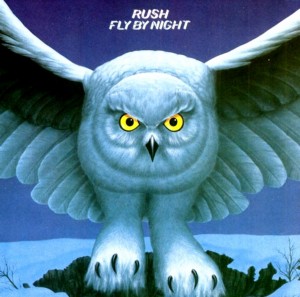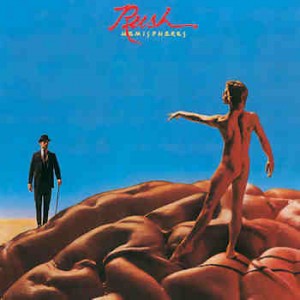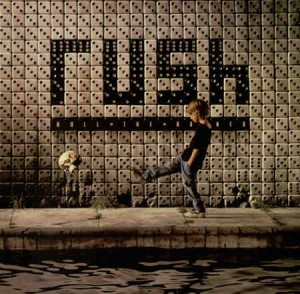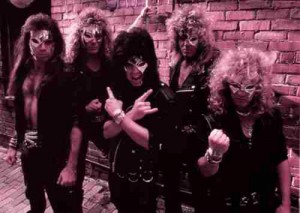RUSH and prog rock author Jeff Wagner talks about every RUSH album ever made
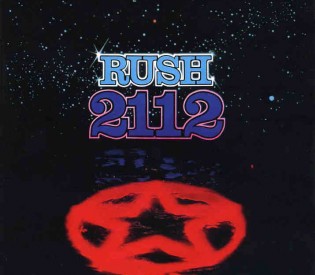
Since 2-1-12 is National Rush Day (get it?) we decided to bring you a little discussion of all things Rush with author (former Metal Maniacs editor) Jeff Wagner. Jeff has written a critically acclaimed book called MEAN DEVIATION, published through Bazillion Points Publishing which is really the first book ever written on the progressive metal genre. The book covers the development and cycles of change within the genre and features bands like Queensryche, Fates Warning, Dream Theatre and a little Canadian band called RUSH. We talked with Jeff about his foray into book writing, his thoughts on Queensryche and Crimson Glory and talked about every single studio album RUSH ever made. So without further ado, click play on the 2112 full song link in the upper right hand youtube corner of the page, sit back and read on…. (This post is dedicated to longtime RUSH photographer and associate Andrew MacNaughtan, R.I.P.)
Legendary Rock Interviews: Your book MEAN DEVIATION covers RUSH in addition to a lot of bands really. It covers so many we actually couldn’t get into all of them without being on the phone for hours. You were the editor at Metal Maniacs which was kind of like Metal Edge except you covered Testament and Celtic Frost instead of Trixter and Firehouse.
Jeff Wagner: Yeah we actually had the same publisher as Metal Edge and we were sort of the heavier counterpart of Metal Edge and it was a pretty radical magazine as far as the bands we covered in our day compared to what was on the newstand.
LRI: Was that time spent covering some of those more obscure bands influential when it came time for you to write this book on progressive metal?
JW: Sure. Even when I was younger as a fan I was always gravitating towards a lot of the more obscure metal bands. I was into Metallica when they were obscure (laughs). I was always digging around the underground and just kind of had a genuine interest in that sort of stuff. Doing that magazine certainly got me more involved and in touch with a lot of the artists that I cover in the book so I think in a lot of ways it was sort of a primer for me when I left the magazine that led to me eventually writing a book.
LRI: MEAN DEVIATION covers a slightly more obscure subgenre of the already sort of niche area of heavy metal, is that fair to say?
JW: Yes, absolutely. I try to make it pretty clear in the book also that Prog Metal is different from Doom Metal or other genres like thrash metal in that there’s not necessarily a sound that makes all the bands a part of it. It’s more of an attitude or application of a pretty wide variety of eclectic influences that go into being considered progressive metal. One of the common denominators in all of these bands is that they are all reaching for something a bit different. I sort of take issue with the construct of prog metal as a “sound”. I don’t think it’s just a Dream Theater sound or a Tool sound or even a RUSH sound. I think it really encompasses a wide variety of musical approaches and i think MEAN DEVIATION covers that as well. I know you’re into a lot of the traditional meat and potatoes rock and metal and I think that’s great. I read on your site how you are known to mention Cheap Trick and KISS as much and as out of context as Eddie Trunk mentions UFO (laughs). That’s great. I’m a big fan of those two bands as well. I think if you get too deep into progressive metal you can lose sight of that fact which can’t be ignored. All of these super progressive bands ultimately originate from that basic rock or metal template and there’s nothing wrong with that.
LRI: I talked with Geoff Tate and am a big fan of Queensryche but those guys don’t really consider themselves prog metal. I love QUEENSRYCHE and hate DREAM THEATER so I wonder whether some of the bands are even aware or embrace being labelled progressive metal.
JW: I really don’t think many of the bands consciously think about it. I think most of them are just creating music that excites them and that allows them to get out their creative urges. Then again, that’s the case with any kind of band. Even the most generic of bands is getting something out just by picking up their instruments and trying to write their own song. I think a lot of these bands just do what they do and it’s really a term that other people have come up to describe what they do. It’s a way to say “Hey, here’s band X and their music is similar or different to band Y”.
LRI: Another popular catchphrase used to be “Thinking Man’s Metal”.
JW: That’s something I mention in the book as well. That’s not a term that stuck very well and I think Tech or Prog metal kind of ended up replacing that terminology. Queensryche was definitely tagged as “Thinking Man’s metal” back in the day. Geoff Tate may distance himself from the metal tag these days but I don’t think he has ever denied that they were a metal band back in the eighties. They have since evolved away from that and are more of a modern rock band now and that’s fine but those steps they took and what they did in the 80s were very, very important and inspired a lot of bands that really did epitomize what is known as progressive metal. You can’t listen to an album like RAGE FOR ORDER or OPERATION MINDCRIME and not hear the innovation and progression. Within two years they went from being sort of an Iron Maiden “ish” sounding band on the EP to the full on highly textured production style of RAGE FOR ORDER. Those were very big and important progressions. They were very cutting edge and a lot of people didn’t get it at the time but that’s the nature of a progressive band. They don’t write for their audience and they can’t. I think if Queensryche was stuck doing that they would end up with ten different variations on EMPIRE. They grow almost faster than their audience and infuse new and different influences as they move along. Most bands just don’t do that.
LRI: I am really unaware of a lot of these bands like Crimson Angel or Celtic Frost or Fates Warning because I guess my tastes really haven’t been all that progressive over the years but I would like to discover more about those bands after checking out your book. Is there something in all of those bands that those of lunkheads who adore KISS or Maiden or Priest can latch onto, are they too progressive to be catchy and hooky?
JW: I think that no matter how weird or outside the norm one of these bands are they all have to have songs or there’s jut nothing to be interested in. I think that a band like Voivoid has definitely had some songs and hook-orientated albums through the course of their career but it just depends, I don’t think any of the bands I talk about are consciously aware of it as much as they are trying to create a general kind of epic soundspace. Later in the book, I get into all these really avant-garde bands that are NOT fun to listen to. They may be interesting for maybe a listen or two but they truly lack any aspect of a song structure. I think it’s in our nature as human beings to seek some kind of a hook or melody or something we can grasp. I think to answer your question, most of these bands do have hooks but some of them you have to wade through some things to get to them.
LRI: I’m wondering what you thought of the RUSH documentary BEYOND THE LIGHTED STAGE. I’m going to commit the ultimate sin as a 37 year old and admit that I just started getting heavily into their albums and career after that movie. I was always aware of the overplayed radio hits and everything but that movie just really portrayed them as real people rather than weird Canadian mathematicians.
JW: I thought the film was very well done and like you I loved that they focused on the band’s personality. Rush draws a lot of criticism because their music is so serious and advanced but I think people forget that Geddy, Alex and Neil are human beings and have some of the best senses of humor of any musician you will find. They’ve had Jerry Stiller and the South Park guys intro the shows over the years which really was funny and I think was needed because they ARE such a serious band of serious musicians. I think all of that really came through in the movie somehow and I think it explained some of their chemistry including how the band came together. I also think it’s really cool that the movie turned a lot of people into RUSH fans like yourself and inspired you to go out and check out their catalog. There’s certainly a lot there to explore. Talk about hooky bands, man is RUSH hooky. During the 80s and 90s they almost turned into melodic rock.
LRI: If you don’t mind I’d like to walk through the band’s catalog actually. As a longtime fan of the band and author of MEAN DEVIATION, I would like to know your thoughts on the studio albums, their songs, artwork, anything actually, beginning with my favorite album, the 1974 self-titled debut, RUSH.
JW: Oh wow, that’s your favorite, I know there are people out there who do feel that way. That one is kind of funny to me because the artwork sort of looks like what the album sounds like. It’s very indicative of 70s hard rock with the big letters and graphic, just kind of a big explosion sort of thing. It’s a very basic RUSH, it’s just as much a Zeppelin or a Cream album as anything they’ve done. You can tell their influences are right on their sleeve there.
LRI: I kind of like a song like “In the Mood” where Geddy’s uncharacteristically singing “Hey Baby” lyrics.
JW: Yeah, it’s like so strange to hear him singing a traditional rock song to a girl like “Whatcha Doin” (laughs). You can totally tell that album doesn’t have the lyrics of Neil Peart. They are not yet the intellectual band they soon became.
LRI: My favorite album cover is probably the next album FLY BY NIGHT, I like the art so much it’s on my wall.
JW: There’s something about that cover I know, it’s arresting. The colors, the rendering of the owl and all of it, it’s just great and especially great of course on vinyl. It’s also a little odd too and that’s when the music started to get a little odd with the influence of Neil Peart on the drums and lyrics. That album has one foot in the old style and one foot stepping towards the more progressive areas they would be known for. Songs like “By-Tor and the Snow Dog” are definitely reaching towards the more progressive leanings of the band with their sort of multi-part , epic tilts. A song like “”Anthem” sounds to me like early metal. If you believe that metal existed in the 70s and I do, then “Anthem” sounds like early heavy metal.
LRI: The third album “CARESS OF STEEL” takes on an even more progressive approach.
JW: Yeah, that album cover is kind of strange with the wizard and the weird pyramid. I know that the gold was supposed to be a sort of steel color but because of a printing error it came out bronze looking and not to the band’s liking. There’s a song that takes up the entire second side, “The Fountain of Lamneth” and has songs like “Necromancer” which were really epic but then it also had songs like “Bastille Day” which was sort of again like an early heavy metal song. CARESS OF STEEL is RUSH reaching pretty far, almost them reaching beyond their capabilities. It didn’t quite gel for them or the label commercially. I think that what RUSH tried for with CARESS OF STEEL they would soon achieve with mastery on 2112.
LRI: 2112 is one of those classic albums that most people insist must be heard from beginning to end to fully appreciate. Do you agree?
JW: Yes, very much although I do find myself splitting it up on occasions into halves. Only because the song 2112 is kind of exhausting, it takes you through a story and there’s just so much to absorb that it’s easy to just take that song completely on its own. Then there’s side B which is more of collection of RUSH songs and they’re all really different and unique in their own way. They were very, very bold on that album. The record company was very clear that they did NOT want another CARESS OF STEEL with long songs and instead wanted a more traditional rock album like the debut. So what does RUSH deliver? An album that OPENS up with a twenty minute song (laughs). They were just like “We are RUSH, this is where we’re going, screw you if you don’t wanna come along”. I think that the band members really did think that it could be their last album with the label because they were taking such a risk. However, their compositional abilities by that point were so well honed and they had such a chemistry that they just pulled off this massive breakthrough album. People finally “got it”. They got what RUSH was trying to do. It really is a truly complete album, that’s for sure.
LRI: Would it be fair to say that FAREWELL TO KINGS came out to sky high expectations?
JW: Yes, although I don’t really think that mattered to much to the RUSH guys to be honest. They were just hoping to move forward and take people with them, that album is a LOT more streamlined in its sound. It has a lot more keyboards coming into their music, there weren’t really a lot of keyboards on 2112 but they are coming more into the picture on FAREWELL TO KINGS. They are really expanding their instrumentation and utilizing technology to a great degree there. To me, that’s a very elegant sounding album. It put them on a whole new level, a whole new playing field so to speak. There is still some hard rock on there, still some early tinges on songs like “Cygnus x-1” which has some totally metal parts. For the most part though they were really growing into a band that was almost hard to categorize by that point.
LRI: The next album HEMISPHERES had another one of those amazing rush cover art pieces. What did you think of that album and the cover art which features the naked male figure walking on the brain?
JW: Yeah, cool art and concept with the HEMISPHPERES of the brain thing, the naked guy is usually referred to as STARMAN which I guess is a better title than ASSMAN (laughs). When you look at that album and the whole scene with STARMAN and the very dapper English gentleman meeting on the surface of the brain it is very clear to the record buyer that they are not getting an AC/DC album. once again, the cover art kind of represents the music contained in the album. It really features some of their most advanced stuff compositionally. You have the really long “Hemispheres” song, you have the epic “La Villa Strangiato” which was their first instrumental and a very complex one at that. With HEMISPHERES you are truly seeing RUSH at their most progressive because they had gotten to a point which was really sophisticated and you can sort of get that from the album cover.
LRI: The band took a couple years to deliver PERMANENT WAVES and it kicked off the 80s with a very accessible, successful album and subsequent tour. Do you notice a progression towards the music being even “hookier” or “sing songy” so to speak?
JW: The cover is sort of a play on words, there’s the girl with the permanent wave hair and there’s waves in the title graphic and her skirt. There’s sort of three different pairs on that album, you get “Freewill” and “Spirit of Radio” which are sort of the “radio”songs and direct tracks and then there’s two really mellow songs and then on top of that there’s two classic RUSH epics in “Jacob’s Ladder” and “Natural Science”. There’s like three pairs of songs that sort of shows them starting to hone their music a little more and cut off some of the excesses and write a little more directly.
LRI: MOVING PICTURES has another great piece of cover art with several pieces of art themselves within it and the album is kind of the same way. Many people point to that album being every bit as important to the catalog or essential as 2112. Do you agree?
JW: I not only can easily tell you that MOVING PICTURES is my favorite RUSH album but if pressed I will probably tell you that it is my favorite album of ALL TIME. I think it is one of the rare instances of a band making a PERFECT album. Every single song is unique to the album and has its own personality, there’s no filler. The production alone is something to rave about and is to me flawless. It sounds SOOOO good. MOVING PICTURES was recorded in 1981 on analog tape and it still sounds so good to this day. It sounds better than most albums produced today, it’s crisp but not too crisp. The performances and songwriting are incredible and as good as they ever could hope for. They had been touring for so long and it was always the same three guys who just got tighter and tighter as a band and MOVING PICTURES is the result of it all just boiling over. They were untouchable in terms of musicianship and I just think every single thing about that album is perfect. It is a must own album and it proves that despite them sometimes having a reputation as a show off band, they were always writing songs. Those songs just happened to be my favorite RUSH songs ever (laughs).
LRI: SIGNALS came next in late 1982 and sort of seemed a little less direct to me and harder to get into. What are your thoughts on that period of the band?
JW: I think it’s kind of simple and the album cover sort of reflects that with its sort of simple, new-waveish look. It was an album that signified another change but I don’t think it was at all in an attempt to get airplay because RUSH by that point was so successful that they didn’t need to be concerned with those things. It was more a sign of the times in terms of emerging technologies with digital synths and all these keyboard textures. That was sort of the new technology of the day and they have always been a band that embraced change and embraced technology so that SIGNALS album is just a continued exploration of that. It’s got an awful lot of keyboards and that also reflected the fact that they were sort of into the new music of the day. Hard rock and progressive rock was sort of dying out in 1982 and bands like Ultravox and the Police were making their presence known. I think RUSH were always still music fans and were truly into a lot of those things. SIGNALS marked a really big shift towards less guitars, more keyboards, shorter songs and maybe less of that original hard rock they were known for.
LRI: GRACE UNDER PRESSURE was the follow up and to me offered more of the same in that they were continuing to experiment but not really with hard rock or metal as much as I’d like. I really hate the album cover for GRACE UNDER PRESSURE
JW: I think that RUSH will always progress and grow but that rate of change or progression starts to slow increasingly from 1984 on. They were getting very slick and rounded around the edges. Look at that album cover, that’s another total new wave-ish looking cover. It sort of looks like it could be a Duran Duran cover, very stylized and totally 1984 . The music was really taking chances and that is always interesting but risky.
LRI: I really love the artwork for POWER WINDOWS, it’s totally got that classic RUSH look to it and is right up there for me with FLY BY NIGHT. The music is still continuing down that synth path but I imagine that’s when a lot of the longhair, denim jacket classic fans REALLY started losing patience and tuning out.
JW: (laughs). Yeah, looking back on my love for the band growing up, I followed them through GRACE UNDER PRESSURE but POWER WINDOWS just lost me completely. I think though, at that time in 1985 I was becoming a true metal kid and listening to bands that were even heavier than RUSH or Maiden or Priest. I was starting to get into Metallica and Slayer and music was more about bands getting “heavier” for me at that time, I was looking for RUSH to use more and more guitars not less and less. POWER WINDOWS was just the sound of RUSH being swamped by keyboards, the music got a little cold and synthetic sounding and it all just totally lost me. I’ve since broadened my horizons a little more than heavy music and tried to go back and get into POWER WINDOWS and there are some songs I like but I still really can’t. They were a different band at that point because they were so into their “less is more” approach because of their songwriting that it was no wonder they lost a lot of us. On the other hand, they gained a lot of people, people who were totally new to the band and caught them on MTV.
LRI: HOLD YOUR FIRE came out after a bit of an absence and right in the middle of the 80s metal renaissance on MTV. Once again, RUSH proved they were hardly trying to run in the same circles as any of that though. The only thing that seemed different was that Alex seemed to approach his instrument a little differently or become more involved in the final mix.
JW: I recently went back to that album and it has since become one of my favorites from that era BECAUSE he really is involved much more on that album than on the three previous records. Alex is really doing a lot on that album but just playing the guitar in more unique ways than the simple heavy metal power chords style. You can’t listen to the guitar in the traditional sense on that album but what he’s doing was VERY involved and very cutting edge. I think that HOLD YOUR FIRE is one of Alex Lifeson’s best albums of his career actually. He had finally figured out his role in this “new” RUSH, it took a couple albums for him to get there but he truly comes into his own on HOLD YOUR FIRE. I really like that album a lot and think it’s one of their strongest of that entire era. The album cover is incredibly simple and sort of speaks of their evolution.
LRI: In 1989 the band sort of reemerged with PRESTO and a lot of the old fans came back into the fold with that album, it was a little more old school.
JW: Well, on one hand it WAS sort of cool and I was into the fact that there were much less keyboards on PRESTO. They kind of started to scale back that end of it and get a little more back into that classic RUSH sound, it wasn’t CARESS OF STEEL, they were never going to go back to that exactly but the guitar was featured a lot more. On the other hand, I think it’s kind of an iffy album, half of the songs I really like and then the other half I really cannot stand at all. I still cannot listen to “Superconductor”, I just think it’s terrible. It’s also a very standard 1989 production and very brittle, it doesn’t stand the test of time very well in my opinion. I think it’s one of their worst SOUNDING albums.
LRI: I’m not going to speak for label or management or band of course but I seem to remember there being a real promotional PUSH on the ROLL THE BONES album in 1991. There was like a little more of a push than your average RUSH album release. It had a really cool cover in my opinion but the songs to me were a little bit of a mixed bag again.
JW: I did get that too as far as there being an added push to the promotion of the album back then even though I was still at that point where i just wasn’t as INTO the band as I was or would soon be again. I do remember that it felt like RUSH was all over again in the media and public eye in 1991. The title track was definitely getting the push from classic rock radio and the name was once again out there. I hadn’t really thought about that in a long time but you are right in that there seemed to be a concentrated effort to get the name back out there again. I think that on the previous two albums they had simply maintained their hardcore audience and ROLL THE BONES was an attempt to build on that. Having said that, it’s probably my LEAST favorite RUSH album, I think I like it even less than POWER WINDOWS. Rush was never, ever a “filler” band but there’s a few songs on ROLL THE BONES that are just not that memorable in any way.
LRI: COUNTERPARTS sounded like they were starting to really take some steps towards reaffirming the original RUSH sound in the context of where music was at in 1993
JW: I think there were steps towards that direction yes, they were starting to make some headway. They weren’t all the way there yet but they were halfway there (laughs). They did come up with what has got to be one of the best RUSH songs ever in the track “ANIMATE”. That song defines what RUSH is all about just as much as anything off of MOVING PICTURES or 2112. “Animate” is just an amazing, amazing and powerful track. There are songs on COUNTERPARTS that are much more guitar orientated and go back to sort of that real sound, without all the keyboard textures drowning it out. There’s a sense that the band was really inspired on that album which was refreshing to hear, it sounds like they really enjoyed making it.
LRI: TEST FOR ECHO came out after another extended hiatus and was sort of along the same lines as COUNTERPARTS, if you liked COUNTERPARTS style it wasn’t a huge shift.
JW: I think it was another step towards making that headway we spoke of to the original sound. I think that the title track and “Driven” are really strong songs that should be a part of their live shows more often. They really have kind of a live feel to them. Interesting album cover again with sort of that classic feel. There’s not a lot of trickery or studio feel to that album it almost has a rehearsal, live feel to it. It’s a pretty good collection of songs and a pretty, smart, confident collection and step towards the RUSH I love.
LRI: The band has always sort of been a live band in that every single tour since the 1970s has been a major event. To me, I get some unspoken sense that the band takes it own direction musically but they HAVE to be aware of the fan feedback when they go out on these massive jaunts. I think in a sense the fans were spoiled in that it was just a given that there would always be an amazing tour and package to look forward to. I think that the band sort of knew what went over gangbusters live and they could use some of that as inspiration for each subsequent album. Then the unthinkable tragedy occurs and Neil loses his daughter and wife and the band is just put on the backburner. It took a long time and a lot of effort but eventually, to me, VAPOR TRAILS was that final move towards everything the band could be in terms of still being progressive but capturing what it was everyone loved about them to begin with. RUSH was back with VAPOR TRAILS and it sounded like the RUSH of old.
JW: I thought VAPOR TRAILS was very cool. It was cool that they were back and that they definitely sounded like RUSH more than ever after such an extended time away. It was like a 6 year wait which is the biggest gap in the catalog to this day but it was nice to have them back and to see Neil back to performing and pouring his heart into that record. I think that the production quality was fantastic, some fans didn’t “get it” or thought it was too raw or distorted or something but I felt more like what you’re indicating. Rush was back. I just listened to it again recently and about the only fault I can find with it on the surface is that its a little long but that again goes back to that hiatus. It really reaffirms what was always amazing about the band and that is that they write REALLY GOOD SONGS and do really interesting things, songs like “Secret Touch” and “Earthshine” or “Ghost Rider”. That album VAPOR TRAILS was a really, really strong album and really made me feel reinvigorated about the band in a way I hadn’t been in years. I really like that the managed a new approach on that album too, there’s really no other RUSH album that sounds like that prodution-wise.
LRI: That brings us to our final album until CLOCKWORK ANGELS is released this year. What are your thoughts on their last album 2007’s SNAKES AND ARROWS and how do you think the new album is coming along?
JW: I think those two songs I have heard from the new album “Caravan” and “BUTB” are very promising and I have a feeling we are all in for something very cool from RUSH in 2012. They are supposedly in final preparation for releasing it and we are all anxiously awaiting the whole album. I will say that SNAKES AND ARROWS didn’t really hit me immediately but it has been a major grower, I like it more with each new listen and it really gets better and better the more you replay it. SNAKES AND ARROWS has actually grown on me so much that I think it’s probably their strongest collection of songs since 1987’s HOLD YOUR FIRE so yeah, it’s a great album. It just took me a while to come around to it. It was yet another instance of the cover art representing that overall feel of the album, it’s a really unique cover and it’s a pretty unique set of songs. That band has always had a tremendous visual sense. That’s one thing that has always remained constant with RUSH. I really value that, especially in this day and age of people not caring about packaging and just releasing straight to iTunes, RUSH has always been there at the forefront of making their material beautiful to look at.
LRI: Speaking of covers your book cover for MEAN DEVIATION really strikes me as being similar to an old VOIVOD cover…
JW: It is, that’s the little Voivod guy on the cover, it’s done by their drummer Away. I’ve always been a big fan of VOIVOD and if you would have told me as a 14-year-old fan that I would someday write a prog-metal book and have the cover art done by Away I would have simply dropped dead. I was such a fan.
LRI: Well, then. I guess that does explain why it looks like a VOIVOD cover then….(laughs)
JW: (laughs). Yeah, it does! I was extremely grateful that he was willing to do that for me and I was thrilled. Ian Christie from Bazillion Points Publishing is also a big VOIVOD fan and when he told me that he wanted to get Away to do the art I was like “Ok, GO FOR IT!!”.
LRI: I do enough of these interviews that it just seems exhausting and daunting to actually write a BOOK. Am I dead on?
JW: It was quite a task. I first thought of the format and thought I could easily do an A-Z reference encyclopedia but that’s just too easy and doesn’t really explain the genre to people who are not totally aware of the subject. There are so many different nuances and styles under this umbrella of prog rock, all these bands sound very different, RUSH, QUEENSRYCHE, and VOIVOD are examples we’ve talked about and i think you’d agree as a huge QUEENSRYCHE fan that they don’t really sound similar at all to those other two. I really tried to get to the heart of why that is and i didn’t strictly pick the only the popular bands to talk about because they don’t necessarily represent the entire genre, there is SO much under the surface that I try to examine. It was a hell of a lot of work and a lot to arrange because there is a helluva a timeline involved and all kinds of different movements that popped up and faded into oblivion along the way. For instance, it was daunting in the sense of well, how do i explain how important King Crimson and RUSH were to the development without ignoring all these other bands. It was also daunting to find the time to do it and fir it into my life while doing day jobs and writing all day is my job so I was understandably not too amped to sit down in front of a computer on my down time and write. I really have to give my wife at the time credit because i basically said “Look, I think I’m going to have to dedicate my weekends, every weekend for the next two years or so to writing this book” She was very gracious and said “Go for it” so basically I would wake up every weekend morning and brew some coffee and work exclusively on this for three or four hours and I am really happy with it.
LRI: Did you try to separate your own opinions and narrative or just go with it. I really like books that speak from the author’s personal journey because music is so personal.
JW: I think people who are into that would like the book a lot more than they otherwise would because it really is written from my perspective and not as some kind of textbook or something. I have always written from a fan perspective even going back to my Metal Maniacs days. I am not a reporter as much a fan who had questions to ask, things to say and opinions, hopefully interesting enough to appeal to other people. That’s a style I have never changed although hopefully I have gotten better as a writer than I was say back in my fanzine days. I still think I write more from a fan perspective than a “journalist” perspective because I am honestly a HUGE fan of all of this music we’re talking about and music in general. You can read and sort of tell where my bias might lie and where I am a massive fan of a certain band or approach but I also try to give every band in the genre their fair due. It’s not a cold, clinical encyclopedia but it’s also not a totally bias slant towards any one band. I was told by the Bazillion Points guys that I could go crazy with the photo and art layout so I really enjoyed that visual part of it as well. I had the freedom to jam as much in as I wanted to but I had to be careful because I didn’t want it to turn into a coffee table book that you couldn’t pick up. I love to read books about music that have lots of illustrations and graphics and I was actually in charge of picking out every single photo or graphic in MEAN DEVIATION which was a blast. I really tried to use as many exclusive photos as I could, photos I hadn’t seen before, photos many people have never seen before.
LRI: Okay, last question. What the fuck was with Crimson Glory and the whole mask thing? I am just truly trying to understand.
JW: (laughs). Okay, that was funny. Ahh, Crimson Glory. So misunderstood. I have gathered from talking to you and looking at your interviews with Pamela and Queensryche that you are a MASSIVE fan of those guys. You should really check out the album “TRANSCENDENCE” from Crimson Glory. I think you will really appreciate that album it is not a ripoff so much of RAGE FOR ORDER but it definitely has some of that feel to it. It is a great album. As far as the masks go…….I think they look kind of STUPID. You know, although since we’re both KISS fans I guess we have to give them credit for trying a different approach to standing out. By the time Crimson Glory arrived we had already seen KISS and Alice Cooper and all of this with Bowie and Genesis and there was really a lot of covered ground as far as makeup goes. I guess they figured, that’s all been done so “let’s wear masks” (laughs). The problem with that was while the makeup enhanced the personalities or characters of KISS or Alice or Bowie it just kind of hid the personalities behind Crimson Glory. All these other acts were magnifying their personalities and amplifying something within themselves where CRIMSON GLORY was simply hiding behind these masks and being sort of hard to relate to. On the “TRANSCENDENCE” album they cut the masks in half and exposed half of their faces to appear half human but that just looked kind of stupid too. I am a big fan of the band and there are definitely pockets of us out there that you will find who are big fans of the band and their first two albums but the mask thing was just kind of dumb, it got them some initial attention but I don’t think it achieved what they wanted to achieve.
http://www.bazillionpoints.com/progress/
https://www.facebook.com/meandeviation
Category: Interviews
